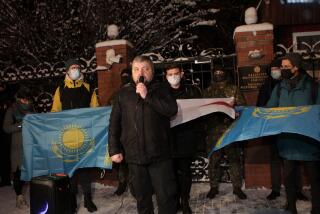FREEDOM : After 48 Years, Ukrainian Fugitive Comes In From Cold
- Share via
KIEV, Ukraine — As a young, ardent Ukrainian nationalist, Ilya Oberyshyn burned his Soviet passport in 1944. His rebellion against Communist rule turned him into a non-person--and a fugitive.
Oberyshyn could not get a job, a home or a wife. No hotel or hospital would admit him. And he faced immediate arrest simply for not carrying his internal passport, a document that allowed the old Soviet police to keep track of each and every citizen.
But Oberyshyn accomplished what millions of other opponents of Soviet rule could not: He escaped the omniscient eyes of the KGB, the Soviet security police. “Only Jules Verne could describe it,” Oberyshyn said of the half century he spent incognito, living in train stations, sleeping in open fields and scrounging for food.
Soft-spoken and neatly dressed, Oberyshyn, now 71, resembles a kindly grandfather more than a rebel.
But until 1960, he carried a gun; after that, he carried rat poison to commit suicide, if caught. “Otherwise, they would have used me to spit on the idea of Ukrainian independence,” he explained.
“They” were the Bolsheviks. Oberyshyn uses only that word, Bolsheviks-- not “Communists” or “Soviets” or “Russians”--to describe his lifelong enemies. They, of course, were destroyed by the botched coup last August in Moscow. The Communist Party was dissolved, the KGB was dismembered and the disintegration of the Soviet Union began.
But even this was not enough to persuade Oberyshyn to come out of hiding. Only after Ukraine’s landslide vote for independence on Dec. 1 did he decide that it was time to turn himself in. “I fought for this my whole life,” he said, savoring Ukraine’s independence.
For Oberyshyn, the battle began in 1938, when, on the eve of entering medical school, he took the secret oath to become a member of the shadowy Organization of Ukrainian Nationalists. Formed in 1929 in western Ukraine, then part of Poland, the group advocated armed revolution. Declared illegal, it operated underground.
When the Nazis invaded the Soviet Union in 1941, quickly overrunning Ukraine, Oberyshyn quit his studies to devote himself to the organization.
In 1944, Oberyshyn was about to join the group’s military wing, the Ukrainian Partisan Army, which was fighting the occupying Nazis--and, at the same time, against Soviet partisans loyal to Moscow. With 50 men, he fought his way to the town of Ternopil and rose to a top post.
But after the Nazis’ defeat, the Soviet secret police turned their attention to the Ukrainian nationalists. Those who escaped death or arrest scattered or escaped to the West.
Oberyshyn, however, stayed and went underground.
Oberyshyn will not explain how he eluded official attention for so long, saying simply, “That’s my art.”
After the Ukrainians voted for independence and he surfaced, his story seemed too fantastic to believe.
“I didn’t recognize him at all,” Teodor Krul, a friend from medical school, said. “The last time I saw him was in 1944. Only his smile gave him away.”
More to Read
Sign up for Essential California
The most important California stories and recommendations in your inbox every morning.
You may occasionally receive promotional content from the Los Angeles Times.













